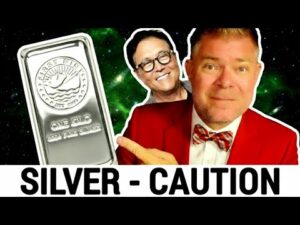
Jeffrey Gundlach, a well-known billionaire and affectionately referred to as the "Bond King," has expressed concern over the potential risk that the U.S. dollar's reserve status may face due to the escalating national debt. He cautioned that the future of the U.S. dollar, along with the probability of uncontrolled inflation, largely hinges on regulating both budget and spending.
Gundlach's Warning on U.S. Dollar's Reserve Currency Status
Jeffrey Gundlach, who serves as the CEO and chief investment officer of Doubleline, an investment management firm, has sounded an alarm about the possible risk to the U.S. dollar's reserve currency status if the United States fails to rein in its spending. This title of "Bond King" was bestowed upon Gundlach after his appearance on Barron's cover as "The New Bond King" back in 2011. With a net worth currently standing at $2.2 billion as per Forbes, his firm is in charge of roughly $150 billion of assets under management (AUM).
The Future of the U.S. Dollar
According to Gundlach, "The future of the U.S. dollar, and possibly spiraling inflation, depends on getting the budget and spending under control." He further emphasized that should the Federal Reserve persist in hiking rates, or should the national debt continue to soar – a likely scenario in his view – the problem will only exacerbate.
Rising Interest Rates on U.S. Treasury Debt
The weighted average interest rate on U.S. Treasury debt witnessed a rise to 2.92% as of August, a significant jump from the 1.97% seen during the same period the previous year. Gundlach suggested that given the current Federal Reserve borrowing rates, the interest rate on U.S. debt could potentially climb to 5.5%. He explained that in such a situation, the nation's annual interest bill could exceed $1.8 trillion, more than twice the current defense budget. It's worth noting that the interest expense over a span of just two years has ballooned from $500 billion to nearly $900 billion, already outpacing defense spending.
Warnings from Other Financial Experts
Gundlach isn't the only one raising the alarm about the U.S. debt level and the USD. CEO of JPMorgan, Jamie Dimon, also expressed worries about the fiscal money spent in the U.S., which he described as "so big." He further noted that this spending is "the largest in peacetime ever … with very high deficits and QT we've never had." His concern also extends to the potential for stagflation. Furthermore, renowned investor Jim Rogers suggested that the reign of the U.S. dollar is coming to a close, with the Chinese yuan being the only worthy successor. Similarly, Jefferies, a global financial services firm, issued a warning earlier this month about the possible collapse of the U.S. dollar.
The Verdict
Do the views of Bond King Jeffrey Gundlach align with yours? We welcome your thoughts on this topic.
Frequently Asked Questions
What is the tax on gold in Roth IRAs?
An investment account's tax is calculated based on the current value of the account, and not on what you paid originally. All gains, even if you have invested $1,000 in a mutual funds stock, are subject to tax.
You don't pay tax if you have the money in a traditional IRA/401k. Dividends and capital gains are exempt from tax. Capital gains only apply to investments more than one years old.
These accounts are subject to different rules depending on where you live. In Maryland, for example, withdrawals must be made within 60 days of reaching the age of 59 1/2 in order to qualify. Massachusetts allows you to wait until April 1. New York has a maximum age limit of 70 1/2. To avoid penalties, plan ahead so you can take distributions at the right time.
What is the tax on gold in an IRA
The fair value of gold sold to determines the price at which tax is due. If you buy gold, there are no taxes. It is not income. If you sell it later you will have a taxable profit if the price goes down.
For loans, gold can be used to collateral. Lenders try to maximize the return on loans that you take against your assets. This usually involves selling your gold. There's no guarantee that the lender will do this. They may hold on to it. They might decide to sell it. You lose potential profits in either case.
To avoid losing money, only lend against gold if you intend to use it for collateral. Otherwise, it's better to leave it alone.
What are the benefits of a Gold IRA?
The best way to invest money for retirement is by putting it into an Individual Retirement Account (IRA). It's not subject to tax until you withdraw it. You control how much you take each year. There are many types of IRAs. Some are better suited for people who want to save for college expenses. Some are for investors who seek higher returns. Roth IRAs permit individuals to contribute after the age 59 1/2. Any earnings earned at retirement are subject to tax. These earnings don't get taxed if they withdraw funds. This account may be worth considering if you are looking to retire earlier.
Because you can invest money in many asset classes, a gold IRA works similarly to other IRAs. Unlike a regular IRA you don't need to worry about taxes while you wait for your gains to be available. This makes gold IRA accounts excellent options for people who prefer to keep their money invested instead of spending it.
Another benefit to owning IRA gold is the ability to withdraw automatically. That means you won't have to think about making deposits every month. Direct debits could be set up to ensure you don't miss a single payment.
Finally, gold remains one of the best investment options today. Because it isn’t tied to any specific country, gold’s value tends to stay stable. Even during economic turmoil the gold price tends to remain fairly stable. As a result, it's often considered a good choice when protecting your savings from inflation.
How much money should my Roth IRA be funded?
Roth IRAs are retirement accounts where you deposit your own money tax-free. The account cannot be withdrawn from until you are 59 1/2. There are some rules that you need to keep in mind if you want to withdraw funds from these accounts before you reach 59 1/2. You cannot touch your principal (the amount you originally deposited). You cannot withdraw more than the original amount you contributed. You must pay taxes on the difference if you want to take out more than what you initially contributed.
The second rule states that income taxes must be paid before you can withdraw earnings. So, when you withdraw, you'll pay taxes on those earnings. Consider, for instance, that you contribute $5,000 per year to your Roth IRA. Let's further assume you earn $10,000 annually after contributing. You would owe $3,500 in federal income taxes on the earnings. So you would only have $6,500 left. This is the maximum amount you can withdraw because you are limited to what you initially contributed.
The $4,000 you take out of your earnings would be subject to taxes. You'd still owe $1,500 in taxes. You would also lose half of your earnings because they are subject to another 50% tax (half off 40%). You only got back $4,000. Even though you were able to withdraw $7,000 from your Roth IRA,
There are two types: Roth IRAs that are traditional and Roth. A traditional IRA allows you to deduct pre-tax contributions from your taxable income. You can withdraw your contributions plus interest from your traditional IRA when you retire. A traditional IRA can be withdrawn up to the maximum amount allowed.
Roth IRAs won't let you deduct your contributions. Once you are retired, however, you may withdraw all of your contributions plus accrued interest. Unlike a traditional IRA, there is no minimum withdrawal requirement. You don’t have to wait for your turn 70 1/2 years before you can withdraw your contributions.
How much gold should your portfolio contain?
The amount of capital that you require will determine how much money you can make. For a small start, $5k to $10k is a good range. Then as you grow, you could move into an office space and rent out desks, etc. This will allow you to pay rent monthly, and not worry about it all at once. You only pay one month.
It is also important to decide what kind of business you want to run. In my case, we charge clients between $1000-2000/month, depending on what they order. If you are doing this type of thing, it is important to think about how much you can expect from each client.
You won't get a monthly paycheck if you work freelance. This is because freelancers are paid. Therefore, you might only get paid one time every six months.
Before you can determine how much gold you'll need, you must decide what type of income you want.
I suggest starting with $1k-2k gold and building from there.
Statistics
- Contribution limits$6,000 (49 and under) $7,000 (50 and up)$6,000 (49 and under) $7,000 (50 and up)$58,000 or 25% of your annual compensation (whichever is smaller) (lendedu.com)
- The price of gold jumped 131 percent from late 2007 to September 2011, when it hit a high of $1,921 an ounce, according to the World Gold Council. (aarp.org)
- (Basically, if your GDP grows by 2%, you need miners to dig 2% more gold out of the ground every year to keep prices steady.) (smartasset.com)
- You can only purchase gold bars at least 99.5% purity. (forbes.com)
- If you take distributions before hitting 59.5, you'll owe a 10% penalty on the amount withdrawn. (lendedu.com)
External Links
forbes.com
- Gold IRA: Add some sparkle to your retirement nest egg
- Understanding China's Evergrande Crisis – Forbes Advisor
finance.yahoo.com
law.cornell.edu
- 7 U.S. Code SS 7 – Designation of boards of trade as contract markets
- 26 U.S. Code SS 408 – Individual retirement plans
irs.gov
How To
Three ways to invest in gold for retirement
It's essential to understand how gold fits into your retirement plan. You can invest in gold through your 401(k), if you have one at work. You may also be interested in investing in gold beyond your workplace. You could, for example, open a custodial bank account at Fidelity Investments if your IRA (Individual Retirement Account) is open. Or, if you don't already own any precious metals, you may want to consider buying them directly from a reputable dealer.
These are the three rules to follow if you decide to invest in gold.
- Buy Gold with Your Cash – Don't use credit cards or borrow money to fund your investments. Instead, put cash into your accounts. This will help you to protect yourself against inflation while also preserving your purchasing power.
- Physical Gold Coins: You should own physical gold coins, not just a certificate. Physical gold coins are easier to sell than certificates. Also, there are no storage fees associated with physical gold coins.
- Diversify Your Portfolio. – Do not put all your eggs into one basket. Also, diversify your wealth and invest in different assets. This can reduce market volatility and help you be more flexible.
—————————————————————————————————————————————————————————————-
By: Kevin Helms
Title: The Future of the U.S. Dollar Amidst Rising National Debt: Analysis by Jeffrey Gundlach
Sourced From: news.bitcoin.com/billionaire-bond-king-jeffrey-gundlach-warns-us-dollars-reserve-currency-status-at-risk-due-to-rising-national-debt/
Published Date: Fri, 20 Oct 2023 00:30:01 +0000














